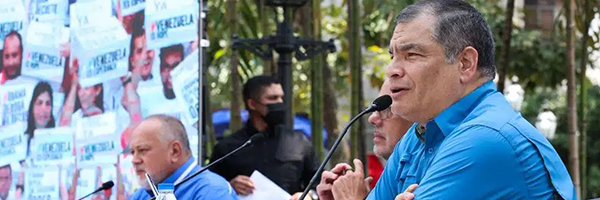Rafael Correa in Caracas: ‘If Someone From the Left Proposes Dollarization, That Person is a Traitor’
 Orinoco Tribune, March 11, 2023 — Caracas, January 19, 2023 (OrinocoTribune.com)— Former president of Ecuador, President Rafael Correa criticized those from the left who are proposing to dollarize the Venezuelan economy and called them “traitors.” He also condemned the illegal sanctions imposed on Venezuela, which represent a “destruction” of international law and have had “very serious effects” on the country’s economy.
Orinoco Tribune, March 11, 2023 — Caracas, January 19, 2023 (OrinocoTribune.com)— Former president of Ecuador, President Rafael Correa criticized those from the left who are proposing to dollarize the Venezuelan economy and called them “traitors.” He also condemned the illegal sanctions imposed on Venezuela, which represent a “destruction” of international law and have had “very serious effects” on the country’s economy.
Correa made these comments on Thursday, March 9, in his speech at an official event in commemoration of Bolivarian Anti-imperialism Day, held in Plaza Bolívar, Caracas. He stressed that the “blockade and aggression against Venezuela is impressive,” which began with the “disastrous Executive Order 13692,” issued on March 2015 by Barack Obama, branding Venezuela “an unusual and extraordinary threat” to US national security.
“What a ridiculous thing, right? A country like Venezuela turns out to be a threat to the greatest power in the history of humanity,” the former president of Ecuador commented. According to Venezuelan economic experts, Correa, who is a well-known economist himself, is closely associated with the recent economic measures taken by the Maduro administration.
Out of the 929 sanctions issued by the US, the European Union and “other countries,” 765 are directed against “people and companies,” while 164 are “general sanctions, issued by the financial system or countries that have the capacity to do so,” Correa recounted.
“Of those 765 specific sanctions, 462 are against people, officials, business owners,” he continued. “This is serious. Can you imagine a finance minister who cannot travel the world freely? A foreign minister who cannot travel to Europe? These things have an impact on public administration.”
For Correa, the “most serious” sanctions are the general ones, including “freezing assets and funds, blocking accounts, paralyzing transfers, blocking trade, punishment and commercial penalties, diplomatic harassment and lawsuits against the country.”
He emphasized that the consequences have been brutal, with a precipitous drop in Venezuela’s foreign income from exports, basically oil, from $57 billion in 2013 to only $743 million in 2020.
He added that mainstream media promotes the idea of “failed socialism,” but they do not talk about South Korea or Singapur developing while having a strong state run economy, or Cuba whose human development indices are the envy of many “so-called developed countries.” He encouraged the audience to ask themselves which countries in Latin America following US dictates and free market formula have achieve real development and growth.

“None,” he answered, not a single country in Latin America has been able to reduce poverty following neoliberal and free market formulas. “And we can not achieve that goal repeating the same things that we have been doing for two hundred years, we need to do things differently,” he added.
On dollarization
Correa also criticized the people who call themselves leftists but propose a dollarization of the Venezuelan economy to improve it.
“It is a complete technical absurdity, unilateral dollarization that is even more serious than a common currency [among different countries],” Correa remarked. “Politically it is true suicide, because dollarizing is adopting a foreign currency. In Ecuador, which is a dollarized economy, we have to go by plane to see the notes in the United States, to exchange the old banknotes for the new ones… If the US wanted to destroy our economy, they could do it in a second.”
He stressed that if other countries dollarize their economies, it will be very convenient for the United States. During Correa’s presidency in Ecuador, the US could have imposed restrictions on sending dollars to Ecuador but did not do so because the effect on the US image would have been very negative, as a decision of that sort would have undesirable effects on the dollarization trend that Washington promotes around the world.
“If a country like Venezuela dollarizes, I am sure that temptation will overcome the US; it would just turn off the dollar faucet and make the economy collapse,” Correa added. “If someone from the left is proposing dollarization, that person is a traitor.”
Venezuelan authorities, under duress from the US sanctions and blockade and the hyperinflation crisis of 2019-20, took a decision in 2018 to flexibilize the use of international currencies like the US dollar, Euro, and currencies of neighboring countries like the Colombian peso and the Brazilian real in border areas. The decision has eased the life of millions of Venezuelans who were suffering from the continuous devaluation of the Venezuelan bolivar at the peak of the crisis. However, this is not at all a formal dollarization of the Venezuelan economy, as PSUV leader Diosdado Cabello remarked later in the same event, where he was part of the same panel as Correa.
